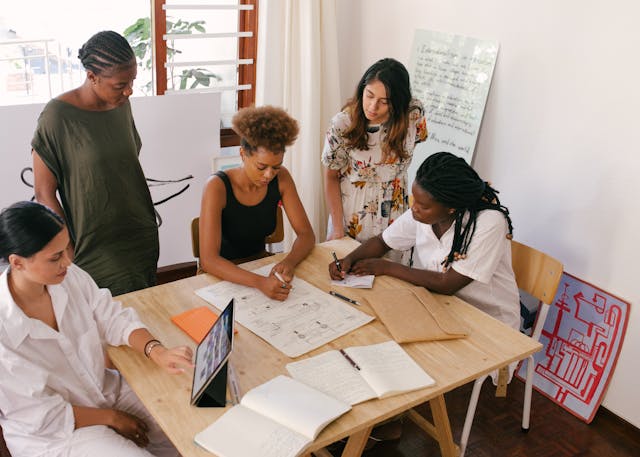As we strive to cultivate diverse and inclusive workplaces, addressing unconscious bias in hiring is a crucial step. Often, these biases towards race, ethnicity, and disability can inadvertently influence recruitment decisions, resulting in a less diverse workforce. By recognising and confronting these biases, recruiters and hiring managers can help foster an equitable and inclusive work environment.
Table of Contents
Unveiling Unconscious Bias
Unconscious biases, also known as implicit biases, are automatic, subconscious stereotypes or beliefs that we hold about certain groups of people. These biases can be formed through various factors, including our upbringing, culture, experiences, and societal influences. They can affect our decisions and actions, often without us realising it.
The Role of Unconscious Bias in Hiring
In the context of hiring, unconscious biases can inadvertently affect our judgment about a candidate’s skills, competencies, and overall fit for a role, leading to unfair decisions. For instance, we may be more inclined to hire someone who went to the same college we did, or someone who shares our own hobbies or interests, without realising these factors are influencing our decision.
Specific types of unconscious bias that can occur during the hiring process include:
- Confirmation Bias: This is the tendency to interpret or seek out information that confirms our pre-existing beliefs or ideas. In hiring, this might mean focusing on aspects of a candidate’s resume or interview that confirm our initial impression of them, while overlooking other important information.
- Halo Effect: This is the tendency to view someone positively due to one positive characteristic, which can lead us to overlook their potential weaknesses. For example, if a candidate has an impressive degree or previous job, we may overlook other aspects of their experience or skills that might be more relevant to the job at hand.
- Similarity Bias: This is the tendency to prefer people who are similar to us in some way, whether it’s through shared interests, similar backgrounds, or even physical resemblance. In hiring, this can lead to a lack of diversity, as we subconsciously favor candidates who remind us of ourselves.
Reframing the Consequences: Unconscious Bias and its Effects on Racial, Ethnic, and Disability Diversity
In-depth understanding of Unconscious Bias and Its Effects:
Unconscious bias, also known as implicit bias, refers to the biases we harbor unknowingly that influence our perception, judgment, and decision-making. These biases, shaped by our experiences and societal conditioning, can unfairly impact individuals from certain racial, ethnic, and disability groups in the hiring process.
- Resume Screening: Studies have shown that candidates with names that sound ‘ethnic’ or ‘non-Western’ are less likely to be called for interviews, even when their qualifications are identical to other candidates. This unconscious bias in resume screening can prevent racial and ethnic minorities from advancing in the hiring process.
- Interviews: Unconscious bias can also infiltrate interviews. Interviewers may subconsciously favor candidates who look like them, share similar backgrounds, or communicate in a similar style, leading to a homogenous workforce that lacks diversity. For candidates with disabilities, bias can manifest in doubting their abilities or focusing more on their disability than their qualifications and skills.
- Job Offers: The final stage of hiring is not immune to unconscious bias. It can influence salary negotiations and job offer decisions, with minority candidates often receiving lower offers compared to their counterparts.
- Professional Development: Beyond hiring, unconscious bias can also affect opportunities for growth and professional development within the company. Employees from minority groups or those with disabilities might be overlooked for promotions, high-profile projects, or mentoring programs.
Counteracting Unconscious Bias:
Addressing unconscious bias requires intentional effort and systemic changes in the recruitment process:
- Blind Hiring: This involves removing identifying details from resumes, such as names and addresses, that might reveal a candidate’s race, ethnicity, or disability status.
- Structured Interviews: Having a set list of questions for every candidate can ensure consistency and fairness in the interview process.
- Unconscious Bias Training: Regular training sessions can help raise awareness about unconscious bias and provide strategies to counteract them.
- Diverse Hiring Panels: Including people from different backgrounds in the hiring process can help to check biases and promote diversity.
- Equal Opportunities: Ensuring that all employees have access to professional development opportunities, regardless of their race, ethnicity, or disability status.
- Regular Audits: Regularly reviewing and updating hiring practices to ensure they are inclusive and fair.
Addressing unconscious bias is not just the right thing to do, it is also crucial for organisations that want to harness the benefits of a diverse and inclusive workforce. It encourages creativity, innovation, and can lead to better decision-making by bringing together a variety of perspectives.
Strategies for Combating Unconscious Bias
✔️ Implement AI-driven Recruitment Tools:
Artificial intelligence (AI) has the potential to eliminate human bias from recruitment processes. AI-driven tools can screen and shortlist candidates based purely on their skills, qualifications, and experience, ignoring factors such as race, ethnicity, or disability status.
✔️ Facilitate Interactive Bias Workshops:
Rather than traditional training programs, interactive workshops encourage active participation and provide practical, hands-on strategies to recognise and mitigate biases. These workshops can be more effective as they stimulate thinking, encourage introspection, and foster a shared commitment to address biases.
✔️ Encourage “If-Then” Planning:
“If-Then” planning is a psychological strategy that can help individuals respond proactively when they encounter a situation that may trigger unconscious bias. For instance, “If I find myself favoring a candidate because they attended the same university as I did, then I will remind myself to focus on the candidate’s skills and experiences instead.”
✔️ Normalise Open Conversations About Bias:
Create an environment where it’s safe to discuss unconscious bias. Open dialogue can raise awareness, challenge preconceived notions, and promote the development of strategies to combat bias collectively.
Organisations can more effectively address unconscious biases and foster a more diverse and inclusive work environment with these strategies.
Key Takeaways
Unconscious biases can significantly impact the hiring process and hinder workforce diversity.
Unique strategies to combat unconscious bias include using AI-driven recruitment tools, facilitating interactive bias workshops, encouraging “If-Then” planning, and normalising open conversations about bias.
It’s crucial to create an open, safe space for dialogues about unconscious bias, allowing the organisation to address these issues collectively.
Recognising and actively addressing unconscious bias can lead to a more diverse and inclusive workplace.


